Oil and gas: all about Forex energies trading
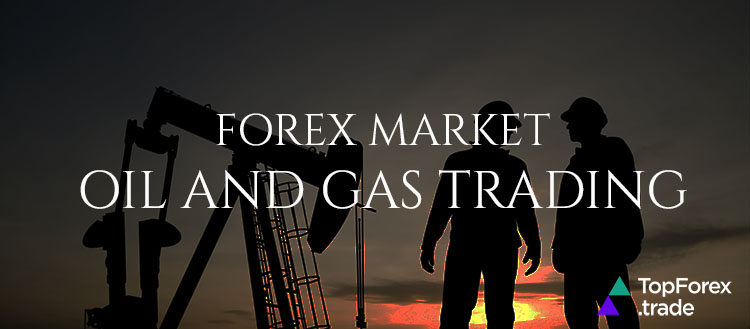
Modern brokers’ trading platforms offer users a wide range of assets: not only currency pairs, stocks, and stock indices, but also commodities, and energies like gas, and oil.
Trading in energy commodities is very popular all over the world and promising for traders who prefer intraday trading and want to diversify their portfolios. Market participants can transact without physical delivery using futures, options, CFDs, and other instruments, giving them more flexibility in managing their price risk.
At the same time, the global oil and gas market is developing unevenly. It is influenced by many economic and political factors that need to be taken into account: there may be structural changes in its sectors and segments, globalization, the movement of factors of production, the geopolitical interests of developed countries, and much more. Nevertheless, the demand for oil and gas is not decreasing year over year, since these energies are used not only as fuel but also processed for many sectors of the national economy, which makes these commodities an excellent underlying asset for transactions.
In this article, we will look at the key features of oil and gas contracts, the factors that affect their price change, and the most popular trading instruments, as well as compare the best Forex and CFD brokers for making a deal.
Oil in Forex trading
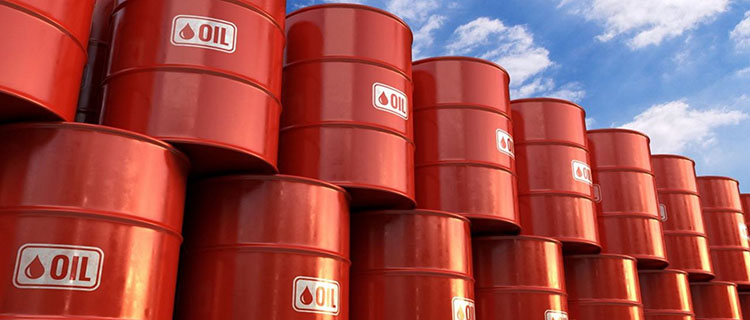
Generally speaking, oil has value because the market needs what is produced from it – fuel and oil products. The main demand for oil is created by fuel buyers such as industry, power plants, and transport. If transportation and production increase, then the demand for oil rises, which leads to higher prices. With an industrial downturn, reduced traffic, and mild winters when power plants don’t have to burn as much fuel, oil prices are falling accordingly.
In the world, there are dozens of grades of oil from different fields and regions. They differ in density, sulfur content, and other impurities. Nevertheless, Grades Brent, WTI, and Dubai Crude are considered references or markers, the prices of which are formed in the course of trading on international exchanges. Then, based on their value, prices for other varieties are calculated.
- Brent is light sweet crude
It serves as the price standard for Europe and OPEC countries. 70% of world oil supplies are estimated in relation to Brent.
- WTI, or Light Sweet Crude Oil
Produced in Texas, it is a light, sweet crude that is well-suited for the production of gasoline and other distillates. In the past few years, WTI quotes are lower than those of Brent, although the quality of these varieties is similar. This is due to high supply costs, storage, and pipeline congestion in the United States.
- Dubai Crude
Dubai Crude is a medium-sulfur oil produced in the Emirate of Dubai (UAE). For a long time, Dubai Crude was the only oil freely traded in the Middle East, but in 2007 the exchange market for Oman oil developed and this grade also became a benchmark.
In most cases, oil is traded together with other similar assets on ordinary commodity exchanges. In the world oil market, such stock exchanges can be distinguished as:
- London ICE Futures Europe;
- New York Mercantile Exchange – NYMEX;
- Singapore Commodity Exchange – SICOM;
- Dubai Mercantile Exchange – DME;
- Tokyo Commodity Exchange – TOCOM;
- Shanghai Futures Exchange – SHFE.
The largest volume of non-cash trading in oil is on the stock exchanges in London and New York. Besides, oil is highly respected by Dubai traders, and also in Tokyo because Japan is the largest oil importer, and also in Shanghai because there are a lot of oil traders since a large number of tankers pass through Shanghai.
In general, Forex oil trading is not much different from the usual trading of currency pairs. The difference is primarily only in marginal trading with leverage.
Gas in Forex trading
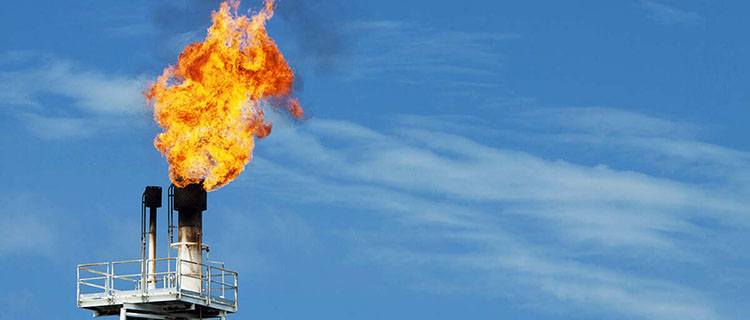
Natural gas is the second most important energy source behind oil. The abbreviation is usually denoted as NG (natural gas), but on some exchanges, such options as NGAS, NATGAS, etc. can be found. Trading on commodity exchanges is carried out mainly using futures contracts. This scheme is characterized by fixed conditions and the possibility of delayed delivery of purchased goods.
Natural gas is highly influenced by seasonality, geopolitical events, weather, supply and demand, storage, and global production. Many traders basically take advantage of small price fluctuations in this market using a combination of Technical, Fundamental analysis, or Sentiment analysis.
Natural gas is produced in various locations around the world and traded on international exchanges such as ICE NGX (the largest physical natural gas clearing house), the European Energy Exchange (EEX), GetBaltic Exchange, and the Chicago Mercantile Exchange (CME).
What factors affect oil and gas prices?

Among modern traders, when analyzing quotes and predicting dynamics, it is often customary to put technical analysis in the first place. However, we shouldn’t underestimate the data that occurs in the external environment and has an exogenous impact on market quotes.
Competent economic news analysis allows you to both take advantage of oil during the day and helps to predict the price movement for a sufficiently long period of time.
If you are trading on your own, then you need to follow the real data on the oil and gas market published by various international organizations, private companies, and agencies. Depending on what data will be published, there may be a strong upward or downward momentum that can be capitalized on.
Information that can influence the movement of quotes, and which can be used as a basis for making trading decisions, also includes:
- OPEC decisions on oil production volumes
This information has a huge impact on oil prices, so its timely processing and opening of the appropriate position can bring potential earnings. Reducing oil production quotas by OPEC countries can give the price a strong impetus due to a reduction in the volume of oil supply on the market. An increase in quotas, on the contrary, can significantly bring down the price of oil.
- Oil and gas reserves
Information about the reduction of energy resources or the exploration of new deposits can also influence pricing. However, if the reduction in reserves and the increase in consumption (with the exception of sharp jumps) is a rather weak and long-term price driver, then the exploration of a new large field, accompanied by an increase in production and, accordingly, reserves of extracted fuel, can cause a significant price reduction when data becomes available.
- Embargo
Information about the deterioration or improvement of relations with producing countries can significantly affect the dynamics of energy prices. The introduction by the producing powers of a ban on the export of commodities to any state can increase the solvent demand on the part of these states and, accordingly, the price.
- Catastrophes in mining areas
Any incidents that can physically reduce the volume of production, whether it be a natural or man-made disaster, are instantly reflected on the price chart. When information appears about serious disasters that have affected the operation of, for example, oil-producing equipment, it is worth entering a long position in financial instruments, the underlying asset of which is oil. Typically, such news provokes a price increase, at least short-term.
How to trade oil and gas in the Forex market?
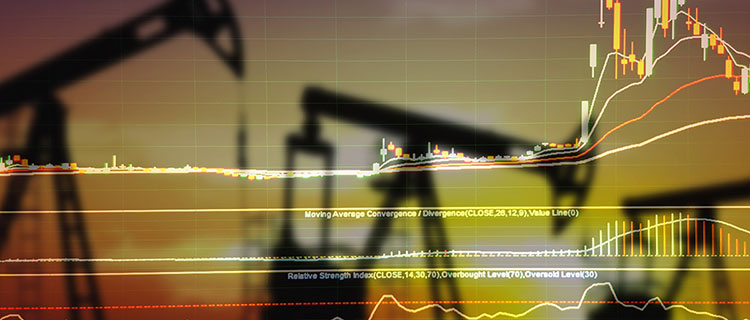
In order to trade oil and gas as an individual, you have an opportunity to open an account with a broker that provides access to the oil and gas market and start taking advantage of price dynamics through the purchase/sale of contracts such as futures, CFDs, options, as well as stocks of oil and gas companies and ETFs. At the same time, you do not need to physically deliver and receive goods, and you can potentially earn income not only from an increase in the price of energy resources but also in a bear market in the case of CFDs.
Oil and gas futures
One of the most convenient tools for working with energy carriers is futures contracts. An oil and gas futures is an agreement between a buyer and a seller to deliver an asset in the future or to pay the difference between the value of the contract itself and the value of the asset specified in it in the future.
Futures can be delivered and settled. In the first case, upon reaching a certain period, oil or gas is delivered to a certain address. Usually, large oil companies practice trading in such contracts, while more than 90% of transactions are carried out under settlement contracts when only the price of an asset and the difference that can be earned on it is of interest. Using futures, traders can buy and sell various grades of oil, natural gas, gasoline, fuel oil, kerosene, and other refined products.
The main advantage of energy futures is the ability to sell and buy the underlying asset without physical delivery. Also, traders can fix the terms of the deal by implementing a trading strategy based on the assumption of a fall or rise in the cost of commodities and refined products.
The most traded energy futures contracts include the following instruments:
- WTI crude oil futures (ticker CL). This contract is traded on the New York Mercantile Exchange (NYMEX) and on the Chicago Mercantile Exchange (CME) electronic trading system. The volume of one futures contract is 1000 barrels, and the value of the underlying asset is calculated in US dollars per barrel. WTI oil is produced in the USA and remains the main benchmark for the cost of commodities in North America.
- Futures for Brent crude oil (BRN). This instrument is traded on the Intercontinental Exchange (ICE) in London. The volume of the contract is 1000 barrels, and the price of the underlying asset is calculated in dollars per barrel. Brent oil is produced in the North Sea. It is the commodity cost benchmark for Europe, North Africa, and the Middle East.
- The natural gas (NG) futures contract is traded on the NYMEX and on the CME electronic trading system. The volume of the contract is 10000 million British thermal units (mmBtu), which is approximately equal to 1000 cubic feet of gas. The value of the underlying asset is calculated in dollars per million British thermal units.
It is possible to explain earnings on futures in simple terms. For example, you expect the price of oil or gas to rise in the future. Therefore, you buy a deferred settlement contract (that is, no deliveries). Wait for the price to rise and close the deal. The advantage of this approach is that there is no need to keep barrels of oil at home or store gas. It is enough to have the futures itself.
Futures trading allows, when opening positions, to deposit not the full cost of the contract, but only a guarantee that can cover the movement in the price of the underlying asset. When closing a position, a trader receives a variation margin – the difference between the prices of an asset at the time of opening and closing a position on a futures contract. If the trader’s forecast is justified, the variation margin will have a positive value, and income will be received.
Oil and gas CFDs
CFDs on commodities, such as oil and gas, are a great way to diversify your investment portfolio, which allows you to take advantage of all the opportunities of these markets without buying goods directly, but trading exclusively on the price of these underlying assets (WTI futures, Brent and others). In other words, a CFD is a contract between a buyer and a seller of a certain asset, which means that the seller pays the buyer the difference between the current price of the commodity and its price at a certain time in the future specified in the contract.
One of the main features of trading CFDs is that you are trading on predictable price movements and you do not have to actually buy (or receive) the underlying asset. Since you can go both short (for falling prices) and long (for rising prices), you can receive income even when the price of a commodity falls. This gives oil and gas CFD traders more freedom of action and more opportunities in different market movements.
CFDs are also more accessible, since the minimum amount to buy futures on the exchange is about $80-90, while on CFDs you can open deals from $5-10. Also, unlike the classic futures, CFDs are much easier to understand, there are no complicated calculations and it is possible to use leverage. Don’t forget, that leverage in trading comes with the risk of losing more than you invest.
Learn about Forex marginal trading with leverage
Oil and gas options
Oil and gas options allow traders to increase their bets on the underlying assets. The trader only needs to forecast the direction of the exchange rate and buy an option above or below the specified price. If the trader was right, he receives his income, regardless of how far the price has gone since the option was purchased.
Options on gas and oil work in the same way as other types of options: a call is a long position and a put is a short position. A trader can go full bull or bear buying either option, most commonly using strike prices to create a spread over which combined options can create a good return with controlled risks.
The main feature of oil and gas options is that prices are influenced by factors related to commodities, not stocks.
Buying stocks of oil and gas companies
One of the options for working with oil and gas with relatively low investment risk is trading in stocks of oil and gas companies. There are many enterprises involved in the extraction, transportation, and processing of energy resources.
The cost of oil and gas can fluctuate quite strongly, however, the price of securities of mining corporations depends not only on it but also on the efficiency of their work, which makes it possible to take advantage even with a decrease in raw material prices.
The choice of assets on the stock market is much wider than on the commodity market, thanks to which traders can buy shares of oil companies in Europe, the USA, or other countries, depending on the economic situation in the world.
Trading in stocks of oil companies for individuals is carried out through brokers since stock exchanges do not work directly with clients.
Oil and gas ETFs
Another way to get a difference from the movement of world oil and gas prices without constant analytics and buying contracts is Exchange-traded funds (ETFs) based on oil and gas assets. Funds can have company stocks in their baskets or be linked to index quotes, which allows them to earn income from price movements without directly purchasing oil or gas contracts.
There are several types of ETFs. For example, funds that have proportional dynamics with the prices of resources – that is, their price changes several times more than the price of the underlying asset. There are also inverse ETFs, the price of which moves mutually back with oil and gas quotes, which allows you to earn on falling prices.
Energies trading tips in the Forex market
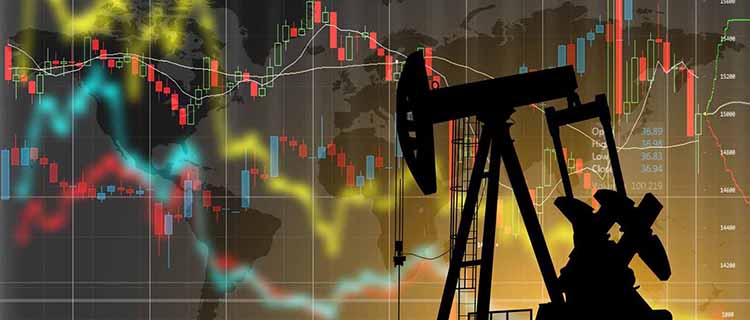
There are several recommendations, following which a trader increases his chances of making an effective deal such as:
- Informed choice of instrument
If a trader wants to carry active day trading, then derivative financial instruments are more suitable for him – futures, options, and contracts for difference. However, those wishing to simply place free funds and check their positions a couple of times a month should prefer stocks.
- External factors
It should be taken into account that most of the instruments, the underlying asset of which is oil and gas, are affected by factors other than the dynamics of the price of commodities, such as changes in the exchange rate in which the instrument is quoted, the actions of the management of the company or the exchange on which it is traded.
- Economic News
It is necessary to pay attention to the information environment in the world since news related to this topic is quite strongly reflected in gas and oil quotes.
- Reliable intermediaries
Do not trade through unknown intermediaries who do not have licenses to operate. It is better to prefer serious trusted companies with a clean reputation that we compare in the article, so as not to lose the deposit for reasons not related to market conditions.
- Price and rates correlations
The price of oil is significantly correlated with many other financial instruments, such as currency pairs. Knowing this, you can take advantage of the analysis of oil and gas quotes without directly trading contracts for it.
Oil and gas Copy trading in the Forex market

Oil and gas is a great option for active trading. These assets are characterized by high volatility, so you can predict strong fluctuations in their value in order to capitalize on the difference in price through transactions, as experienced market participants do, which you can follow using Social trading provided by international online brokers.
The essence of copy trading is to choose the provider of strategies and signals you like, connect to his account, and reflect his transactions in accordance with your deposit. At the same time, even a trader without deep knowledge and experience will be able to make deals and receive his income, while the strategy provider will earn by providing access to his operations.
The well-known online broker NAGA Markets offers an automatic copy feature through its platform to track and copy the best market participants. The auto-copy feature helps you mirror their trades, strategies, and actions with a single click. All you need to do is subscribe to the trader and indicate the amount you want to invest in his portfolio.
Best VPN for safe oil and gas trading

Trading various oil and gas contracts, as well as other assets on the Forex market, is associated with some sensitive information such as passwords, logins, location, as well as various kinds of credit information, which may be subject to various hacker attacks or restrictions from your Internet provider. Therefore, in order to secure the transmission of information with strong encryption, hide your internet activities, or protect against phishing attacks, professional traders recommend using Top VPNs for Forex trading.
ExpressVPN is one of the best VPN providers that has been on the market for over 11 years and has the fastest speeds and the widest network of over 3000 servers in 94 countries around the world. The company uses the exclusively developed Lightway protocol in addition to standard options such as OpenVPN (UDP and TCP), IKEv2, and L2TP/IPSec so that your information is protected by the best innovative technologies.
Click the button below to get one of the best VPN deals for Forex trading:
ExpressVPN users will also be able to seamlessly access streaming sites like Netflix, BBC iPlayer, Disney+, and more in HD quality and without buffering. With one subscription, you can connect up to 5 different devices at the same time that runs on Windows, Mac, iOS, Android, and Linux.
Top Forex brokers for oil and gas trading
In the Forex market, it is relevant and beneficial to trade not only currencies or stocks but oil and natural gas, and other valuable resources. There are a huge number of ways to take advantage of both positive and negative movements in oil and gas prices. At the same time, it is not necessary to buy and store barrels of oil at home. It is enough to use one of the many available financial instruments, the price of which is influenced by oil and gas quotes, or try to combine trading with several of them, developing more complex trading strategies.
As with any financial instrument, Fundamental analysis and Technical analysis are most useful for navigating the energy markets. If you understand how the oil and gas markets work and how they can fit into your portfolio, they can add some diversification to your assets.
You should also use free demo accounts provided by reputable brokers to test your trading approach to popular oil and gas contracts where you can get current market quotes for your trades and a selection of Forex trading indicators. You will also be able to see the market dynamics in real-time and become familiar with the trading tools and terminology.
In addition, in the Forex market, traders can open several accounts in order not only to test their strategies on different trading platforms but also to try various tools and collect all kinds of Forex bonuses up to 100% on the first deposit.
Register, verify accounts and start trading with the top Forex brokers below to compare trading platforms, select multiple instruments and check order execution times.
Exness oil and gas Forex trading
Exness, an international brokerage company, offers crude oil, Brent crude oil, and natural gas vs the US dollar if you prefer energy for your trading. In addition to oil and gas, the broker’s clients can choose currency pairs, precious metals, stocks and indices, and of course more than 30 popular Crypto coins.
In terms of account types, you can pick up options for both retail and professional traders. The first type of which is divided into Standard, Standard Cent account, Raw spread, Exness Zero, and Exness Pro. Traders can choose any depending on the initial deposit, trading instruments, leverage, and spread. Exness services also include the possibility of trading on a demo account, designed to improve trading skills and test new strategies.
In order to make entering the market as smooth and convenient as possible, the company has a wide range of trading platforms, which includes MetaTrader 1, MetaTrader 4, MetaTrader 5, MetaTrader WebTerminal, or Exness Terminal’s own development. The broker also has a mobile app for iOS and Android. In addition, Exness is one of the few companies that offer a VPS server.
The company provides an opportunity to replenish a trading deposit or withdraw earned funds through payment systems such as Perfect Money, WebMoney, NETELLER, and Skrill. It is also possible to withdraw funds to a bank card and bitcoin wallet.
Exness is a highly regulated brokerage provider that is licensed by the FCA, CySEC, FSCA, FSC, FSA, and more. Try trading with Exness using our dedicated button below.
XM Group oil and gas Forex trading
XM Group is one of the largest trading service providers with a wide choice of instruments, among which clients can find CFDs on various grades of oil, gas, energies, stocks, gold, commodities, and more.
Traders have several types of accounts at their disposal, depending on the initial deposit and personal preferences: Micro, Standard, XM Ultra Low, and Shares. In addition, can open a demo account with a deposit of $100000.
XM has different terminals, both the usual MT4 and MT5 and WebTrader for trading through a browser without downloading. You can use them on various devices and as an application for iOS and Android.
XM Group is regulated in several jurisdictions, including ASIC, CySEC, IFSC, and DFSA. The broker also has a very attractive bonus program of 100% for the first deposit and provides the opportunity to connect to a virtual private server (VPS) in London, which will allow you not to worry about interruptions in Wi-Fi networks or electricity. Try trading oil and gas CFDs with XM by clicking on the special button below.
HF Markets oil and gas Forex trading
HF Markets – before rebranding known as HotForex – is one of the best choices if you want to trade futures and spot contracts on the UK and US Crude Oil, besides this the broker has excellent conditions for trading gold by setting low spreads and giving an opportunity to trade shining metal against both the USD and EUR.
Traders can open several types of Micro, VIP, Premium, Fix and Auto accounts with no commissions and a small initial deposit and work on the well-known MT4 and MT5 terminals, as well as which are available on desktop, web, and mobile devices versions for Windows, iOS, macOS and Android. HF Markets also provides a VPS service for a stable connection and the HFcopy trading platform for subscribing to successful traders and copying them.
HF Markets is regulated by several jurisdictions such as CySEC in Europe, FCA (UK), FSCA (South Africa), DIFC (Dubai), and SFSA (Seychelles), according to which the company has the right to provide investment services worldwide. Beginners can get acquainted with the platform on a demo account with a virtual balance of $100000, while experienced traders can test new strategies for free by clicking on the button below.
Plus500 oil and gas CFDs trading
Plus500 is an international online platform that provides CFDs not only on currency pairs, commodities, stocks, and indices but also on energy commodities such as oil, Brent oil, and natural gas.
The company has a trading terminal, developed by the company’s specialists. The platform is available in several versions as a web terminal for PCs and laptops and a mobile app for Android and iOS. The web version requires no download or installation, so you can easily access this platform from anywhere in the world.
Accounts are classified into two types: real and demo. The latter is unlimited so you can work out new strategies, and try unfamiliar tools. Plus500 supports various payment instruments including Visa and MasterCard as well as popular e-wallets such as Skrill and PayPal.
Plus500 works with traders worldwide and is regulated by FCA (UK), CySEC (Cyprus), SFSA (Seychelles), AFSL issued by ASIC, FSP issued by the FMA (New Zealand), MAS (Singapore), and Authorized Financial Services Provider license issued by the FSCA (South Africa). Try trading energy CFDs with Plus500 by clicking on our button below.
82% of retail investor accounts lose money when trading CFDs with this provider. You should consider whether you can afford to take the high risk of losing your money.
OANDA oil and gas Forex trading
OANDA is one of the best online brokers that provide competitive spreads across its full range of Forex and CFD on indices, commodities (oil, natural gas, copper, wheat, and others), Cryptocurrencies, metals, and bonds, more than 100 instruments total.
The broker allows you to choose between OANDA Trade’s fully customizable co-web and desktop platforms and speculation in the Forex markets using MT4. In addition, the broker provides applications for mobile phones and tablets. On mobile, you can access over 50 technical tools including 32 indicator overlays, 11 drawing tools, and 9 chart types with the OANDA apps for iOS and Android.
OANDA creates an excellent environment for new traders as it provides demo accounts, extensive educational tools and market information, and no minimum deposit requirement. In addition, the broker conducts frequent promotional campaigns, providing various Forex bonuses, as well as low commissions and spreads.
OANDA has an extensive license base from regulators such as RFED (the US), MAS (Singapore), IIROC (Canada), FCA (Europe), FSA (Japan), and ASIC (Australia). Try all the OANDA opportunities by clicking our special button.
Oil and gas trading in the Forex market - FAQ